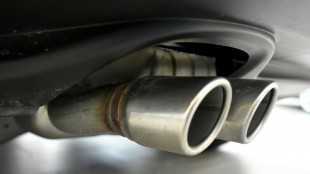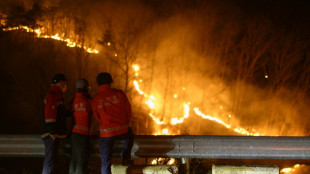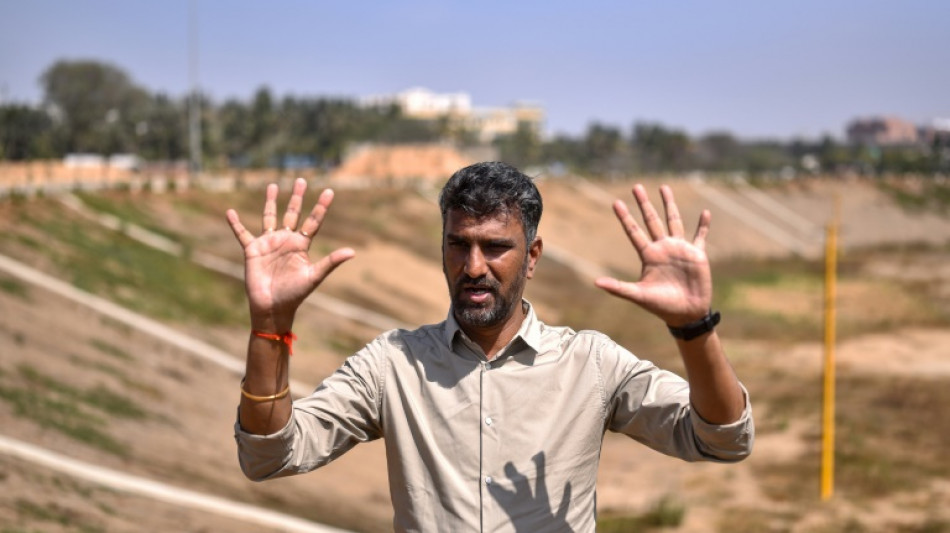
-
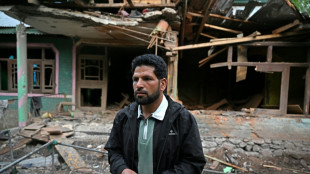 Weary border residents in Indian Kashmir struggle to survive
Weary border residents in Indian Kashmir struggle to survive
-
Leo XIV says Church must fight 'lack of faith' in first mass as pope

-
 Liverpool boss Slot fears replacing Alexander-Arnold will be a tough task
Liverpool boss Slot fears replacing Alexander-Arnold will be a tough task
-
British Airways owner unveils big Boeing, Airbus order

-
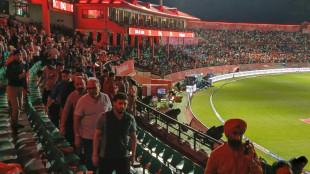 IPL suspended for one week over India-Pakistan conflict
IPL suspended for one week over India-Pakistan conflict
-
Slot says all at Liverpool sad to see Alexander-Arnold go

-
 Leo XIV celebrates first mass as pope in Sistine Chapel
Leo XIV celebrates first mass as pope in Sistine Chapel
-
India says repulsed fresh Pakistan attacks as death toll climbs
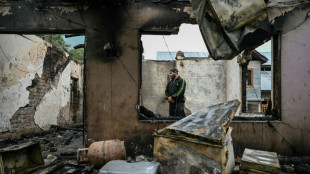
-
 Japan's Panasonic targets 10,000 job cuts worldwide
Japan's Panasonic targets 10,000 job cuts worldwide
-
Putin evokes WWII victory to rally Russia behind Ukraine offensive

-
 China exports beat forecasts ahead of US tariff talks
China exports beat forecasts ahead of US tariff talks
-
Leo XIV, the 'Latin Yankee', to celebrate first mass as pope

-
 Most stocks lifted by hopes for US-China talks after UK deal
Most stocks lifted by hopes for US-China talks after UK deal
-
IPL suspended indefinitely over India-Pakistan conflict: reports

-
 German lender Commerzbank's profits jump as it fends off UniCredit
German lender Commerzbank's profits jump as it fends off UniCredit
-
Rare bone-eroding disease ruining lives in Kenya's poorest county

-
 India says repulsed fresh Pakistan attacks as de-escalation efforts grow
India says repulsed fresh Pakistan attacks as de-escalation efforts grow
-
Zhao's historic snooker title sparks talk of China world domination

-
 'High expectations': EU looks to Merz for boost in tough times
'High expectations': EU looks to Merz for boost in tough times
-
Poisoned guests rarely invited before deadly mushroom lunch, Australia trial hears

-
 China sales to US slump even as exports beat forecasts
China sales to US slump even as exports beat forecasts
-
Indian cricket to make 'final decision' on IPL over Pakistan conflict

-
 Dethroned Bundesliga champions Leverkusen face uncertain future
Dethroned Bundesliga champions Leverkusen face uncertain future
-
China can play hardball at looming trade talks with US: analysts

-
 French monuments in trouble while PSG prepare for Champions League final
French monuments in trouble while PSG prepare for Champions League final
-
Newcastle face Chelsea in top five showdown, Alexander-Arnold in spotlight

-
 Flick's Barca must show 'hunger' in crunch Liga Clasico
Flick's Barca must show 'hunger' in crunch Liga Clasico
-
Clasico the last chance saloon for Ancelotti's Real Madrid

-
 Timberwolves overpower Warriors to level series
Timberwolves overpower Warriors to level series
-
Chinese fabric exporters anxious for US trade patch-up

-
 Putin gears up to host world leaders at lavish army parade
Putin gears up to host world leaders at lavish army parade
-
Nearing 100, Malaysian ex-PM Mahathir blasts 'old world' Trump

-
 Leo XIV, first US pope, to celebrate first mass as pontiff
Leo XIV, first US pope, to celebrate first mass as pontiff
-
Asian stocks lifted by hopes for US-China talks after UK deal

-
 Former head of crypto platform Celsius sentenced 12 years
Former head of crypto platform Celsius sentenced 12 years
-
Ex-model testifies in NY court that Weinstein assaulted her at 16

-
 Strawberry Fields REIT Announces First Quarter 2025 Operating Results
Strawberry Fields REIT Announces First Quarter 2025 Operating Results
-
Amphastar Pharmaceuticals to Present at the 2025 Bank of America Health Care Conference

-
 Ascendant Resources Announces Closing of Second and Final Tranche of Non-Brokered Private Placement
Ascendant Resources Announces Closing of Second and Final Tranche of Non-Brokered Private Placement
-
Nestlé and OMP Showcase Approach to Future-Ready Supply Chain at Gartner Supply Chain Symposium/Xpo in Barcelona

-
 Genflow Biosciences PLC Announces Share Subscription, Director's Dealing and Update
Genflow Biosciences PLC Announces Share Subscription, Director's Dealing and Update
-
Argo Blockchain PLC Announces 2024 Annual Results and Restoration of Listing

-
 'Great honor': world leaders welcome first US pope
'Great honor': world leaders welcome first US pope
-
Pacquiao to un-retire and fight Barrios for welterweight title: report

-
 Trump unveils UK trade deal, first since tariff blitz
Trump unveils UK trade deal, first since tariff blitz
-
Man Utd one step away from Europa League glory despite horror season

-
 Jeeno shines on greens to grab LPGA lead at Liberty National
Jeeno shines on greens to grab LPGA lead at Liberty National
-
Mitchell fires PGA career-low 61 to grab Truist lead

-
 AI tool uses selfies to predict biological age and cancer survival
AI tool uses selfies to predict biological age and cancer survival
-
Extremely online new pope unafraid to talk politics


India's 'lake man' cleans up critical water supplies
Ancient lake systems once provided Bengaluru with critical water supplies, but the Indian tech hub's breakneck expansion left many waterways covered over or used as dumps.
In the rush to modernise, the city once known for its abundance of water largely forgot the centuries-old reservoirs it depended upon to survive, with the number of lakes shrinking by more than three-quarters.
But after experts warned the city of nearly 12 million -- today dubbed "India's Silicon Valley" -- would not be able to meet its water needs with existing resources, mechanical engineer Anand Malligavad decided to take action.
"Lakes are lungs of the earth," said the 43-year-old, known to some as the "lake man" for his campaign to bring scores of them back to life.
"I tell people if you have money, better to spend it on lakes. Decades later, it will serve you."
Water shortages are a chronic problem in India, which has nearly a fifth of the world's population but only four percent of its water resources, according to government think tank NITI Aayog.
Malligavad's first target was a trash-filled and dried-out site he passed on his way to work at an automotive components maker.
"I thought instead of inspiring people... let me start doing it," Malligavad said. "Let it start with me."
- 'Simple cost' -
He began by studying the skills used during the centuries-long rule of the medieval Chola dynasty, who turned low-lying areas into shallow reservoirs that provided water for drinking and irrigation.
The lakes stored the heavy monsoon rains and helped to replenish groundwater.
But of the 1,850 that once dotted the city, fewer than 450 remain today.
Many were destroyed to make room for high-rise towers, while canals were filled in with concrete -- meaning heavy rainfall now sparks flooding and is not stored for the future.
Nearly half of Bengaluru depends on water sucked from intensive groundwater boreholes that often run dry in the summer heat, according to the city's Water, Environment, Land and Livelihoods (WELL) Labs research centre.
Many residents already rely on expensive water trucked in from afar, and the problem is likely to get worse as climate change pushes global temperatures higher and alters weather patterns.
"We're dependent on a precarious groundwater table, and that is going to get even more precarious as you have a more unreliable rainfall," said WELL Labs chief Veena Srinivasan.
"We already don't have enough water to drink," she added, noting that "the water sources that we do have, we are polluting".
Fixing lakes can ease the problem, though the city still needs a large-scale urban water management plan, she said.
Malligavad, trekking out to visit more than 180 ancient lakes, said he saw the "simple cost" they had taken to construct.
They did not use expensive materials but only "soil, water, botanicals (plants) and canals", he said.
He persuaded his company to stump up around $120,000 to fund his first project, the restoration of the 14-hectare (36-acre) Kyalasanahalli lake.
Using excavators, Malligavad and his workers took around 45 days to clear the site back in 2017.
When the monsoon rains came months later, he went boating in the cool and clean waters.
- Natural process -
The restoration process is simple, Malligavad said.
He first drains the remaining lake water and removes the silt and weeds.
Then he strengthens the dams, restores the surrounding canals and creates lagoons, before replanting the site with native trees and aquatic plants.
After that, he says: "Don't put anything into it. Naturally, rain will come and naturally, an ecosystem will be built."
His initial success eventually led him to work full-time in cleaning lakes, raising cash from company corporate social responsibility funds.
So far, he has restored more than 80 lakes covering over 360 hectares in total, and expanded into nine other Indian states.
The renewed reservoirs help supply water to hundreds of thousands of people, according to Malligavad.
Bengaluru resident Mohammed Masood, 34, often fills giant drums of water from one such lake.
He said he typically uses a water tanker, but supplies can be uncertain and expensive.
"If the lake was not built, the hardship would not go away," Masood said. "We would have to go further away for water."
Malligavad said his work has carried some risk -- he has been threatened by land grabbers and real estate moguls, and was beaten by a gang wanting him to stop.
But the sight of people enjoying a restored lake gave him his "biggest happiness", he told AFP.
"Kids are swimming and enjoying it", he said, beside a restored lake.
"More than this, what do you want?"
X.Karnes--AMWN
